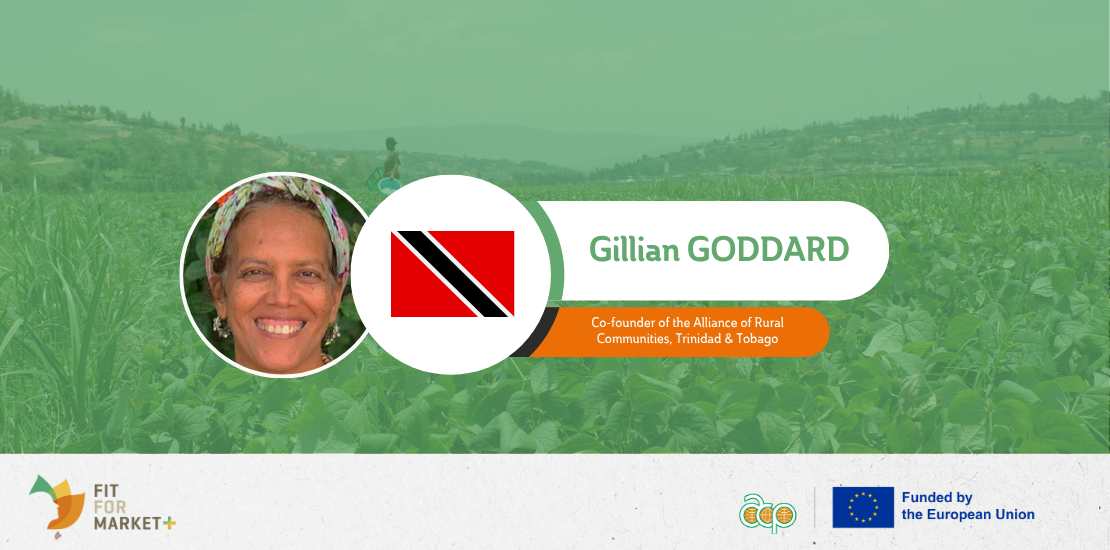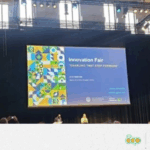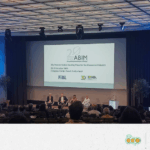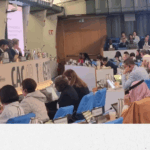- 15/07/2025
- Posted by: Sandra Borma
- Category: News

An activist, systems thinker, and organic food pioneer, Gillian has spent over three decades cultivating not just crops, but community. As co-founder of the Alliance of Rural Communities, she has turned her passion for food justice into a bold movement spanning the Caribbean, Africa, and North America, with a single vision: to restore power, pride, and prosperity to rural communities.
Born in Trinidad and Tobago, Gillian left for the United States at 17, where she built on her gardening experiences by volunteering on an organic farm in Atlanta. Though her studies were not in agriculture, the experience planted a seed. She returned home years later with a desire to reconnect people with land.
She started off by launching Sun Eaters Organics, Trinidad and Tobago’s first organic food store. It quickly became more than just a shop; it was a gathering place and a symbol of possibility. Gillian began working directly with farmers, helping them grow organically, sell locally, and reimagine the value of their crops.
But it was cocoa, the Caribbean’s forgotten treasure, that would become a turning point. Local awareness of the possibility of producing chocolate was scarcely known. Once Gillian learned the process, she realized this was more than a product, it was a tool for economic and cultural liberation.
That realization sparked the formation of the Alliance of Rural Communities in 2014: a grassroots, regenerative movement empowering rural and semi-rural communities through sustainable agriculture, artisanal chocolate-making, and the circular economy.
The Alliance of Rural Communities started small, training cocoa farmers in remote villages of Trinidad and Tobago to craft their own chocolate. But word spread. Soon, neighbouring islands like St. Lucia and Dominica joined in, and then Guyana. In 2021, the Alliance of Rural Communities expanded across the Atlantic to form the Cross Atlantic Chocolate Collective, uniting cocoa growers from the Caribbean with farmers in Ghana, Cameroon, Cote D’Ivoire, Uganda, and beyond.
The Alliance of Rural Communities, alongside the Cross Atlantic Chocolate Collective, champions a range of initiatives, from plastic-free commerce and forest conservation to the use of everyday digital tools like WhatsApp and Google Forms. These tools help organize sales, share training materials, and connect rural entrepreneurs across more than 20 countries. During the COVID-19 pandemic, they became lifelines, allowing the Alliance to pivot to digital catalogues and decentralized logistics, keeping communities fed and connected even in isolation.
Yet, the work has not come without obstacles. Both ARC and CACC remain undercapitalized, often operating with minimal resources. Despite the challenges, Gillian remains grounded in her purpose: to honour the knowledge and strength of rural communities.
In 2022, her work was recognized internationally with the “Soul of Rurality” award by the Inter-American Institute for Cooperation on Agriculture (IICA), celebrating her leadership in biodiversity and rural development.
Through the Alliance of Rural Communities, the Cross Atlantic Chocolate Collective, and a tireless commitment to people and planet, Gillian Goddard is turning forgotten communities into global changemakers.
Gillian Goddard has presented her enterprise during the Caribbean Agrifood Business Session n°18, organised by IICA and COLEAD through the FFM+ programme. This session aimed at showcasing the innovations and successes of Caribbean farmer-led businesses and small and medium enterprises.
If you are interested in this topic, join the Circular Economy discussion on the Agrinnovators Forum.
This activity is supported by the Fit For Market Plus (FFM+) programme, implemented by COLEAD within the Framework of Development Cooperation between the Organisation of African, Caribbean and Pacific States (OACPS) and the European Union. This publication receives financial support from the European Union and the OACPS. The content of this publication is the sole responsibility of COLEAD and can in no way be taken to reflect the views of the European Union or the OACPS.





